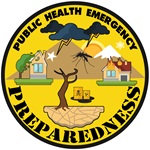Mission
 The Public Health Emergency Preparedness Program (PHEP) enhances the capacity of the Department of Public Health to prevent, prepare for, respond to, and recover from the adverse health effects of public health emergencies and disasters.
The Public Health Emergency Preparedness Program (PHEP) enhances the capacity of the Department of Public Health to prevent, prepare for, respond to, and recover from the adverse health effects of public health emergencies and disasters.
About the Public Health Emergency Preparedness (PHEP) Program
- Continuity of Operations Planning (COOP) - Participants will be provided with a general overview of continuity planning that incorporates how to identify workplace hazards, assess mission essential functions, preserve the safety and security of personnel and essential records, and ensure communication and technological information is accessed, circulated and distributed at the agencies respective level of preparedness.
- Extreme Weather Preparedness: Ways to prepare for seasonal hazards such as the rainy season and flooding, summer heat hazards, and winter weather hazards.
- Mosquito-borne disease prevention.
- Pet preparedness for emergencies.

